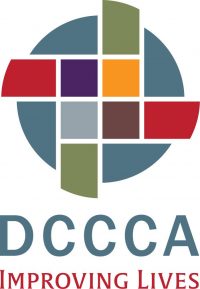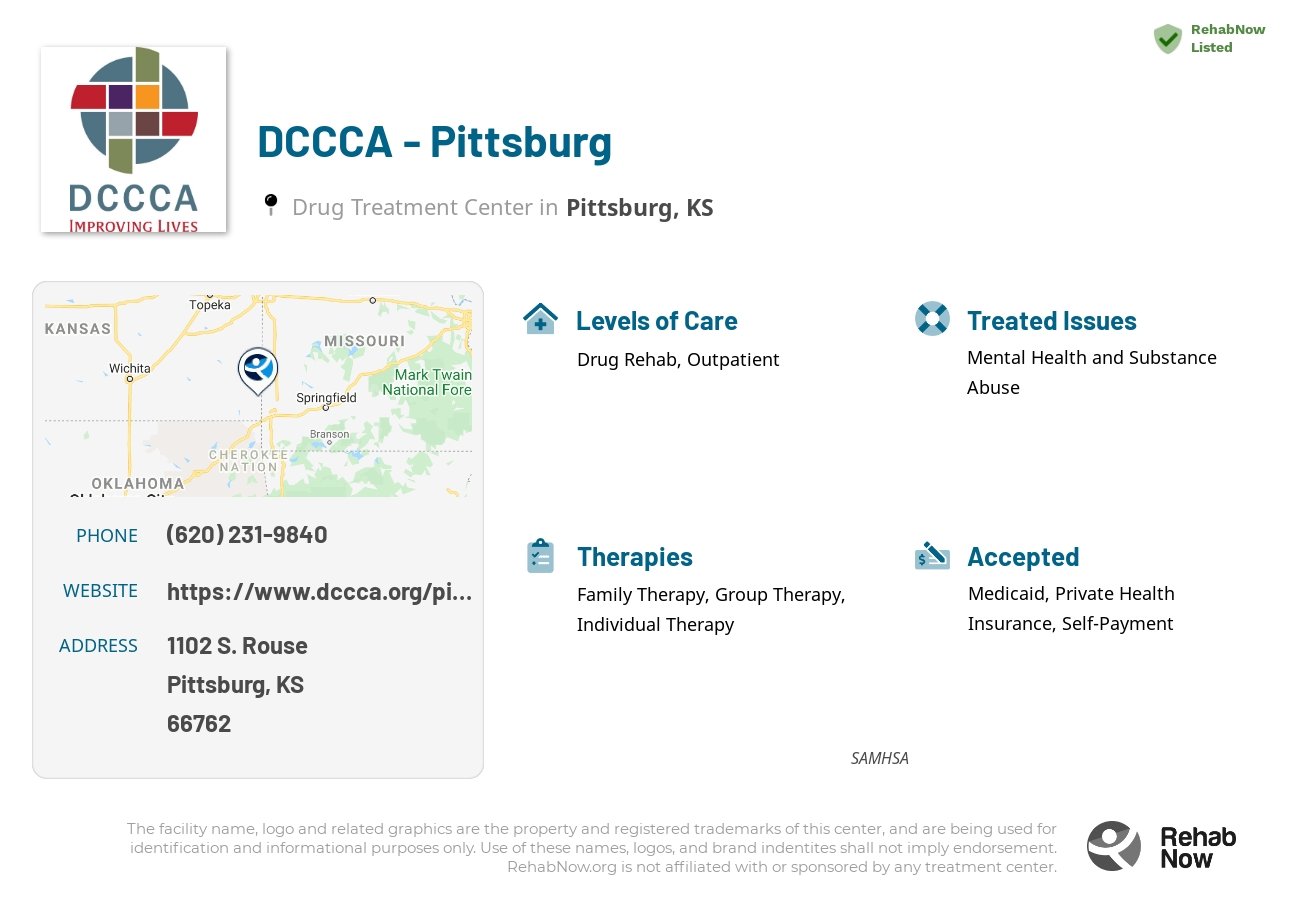About DCCCA - Pittsburg in Kansas
DCCCA - Pittsburg, located in Pittsburg, Kansas, is a world-class addiction treatment center providing comprehensive care for those struggling with alcoholism, opioid addiction, dual diagnosis, and drug addiction. It offers a variety of levels of care including drug rehab, outpatient, and residential, so that everyone can access the level of support that is right for them. DCCCA - Pittsburg is accredited by SAMHSA, the Substance Abuse and Mental Health Services Administration, the national leader in providing quality mental and substance abuse services. In addition, the facility also accepts private health insurance, making it even more accessible.
At DCCCA - Pittsburg, individuals can access a wide range of services designed to help them on their journey to recovery. This includes evidence-based therapies such as cognitive-behavioral therapy (CBT) and dialectical behavior therapy (DBT) to help individuals change their thought and behavioral patterns. Additionally, DCCCA - Pittsburg also provides family counseling, relapse prevention, nutrition guidance, holistic healing therapies, medical services, and peer support groups. All services are provided in a safe and supportive environment, allowing individuals to heal from their addiction with dignity and respect. As an accredited facility and affiliate of the DCCCA, clients of DCCCA - Pittsburg can be assured that they will receive the highest level of care available in the industry.
Genders
Ages
Modality
Additional
Accreditations
SAMHSA
Conditions and Issues Treated
Opioid addiction treatment should be done in a medically supervised drug rehab. While taking opioids, users will typically use other substances to enhance the effects of opioids or to reduce the adverse effects of opioid use. Opioid addiction treatment will include detoxification and drug rehab counseling to help both the user and their loved ones learn how to live a successful sober lifestyle.
Treatments such as methadone, buprenorphine, and naltrexone are three medications that can help treat opioid addiction. These drugs work on the brain’s pleasure center and reduce cravings and the effects of illicit opioids such as heroin. These drugs can be either given orally or by injection. Individual drug rehab counseling sessions can be helpful to discuss any questions or concerns with the drug treatment program. This counseling will also help the user set goals for when they finish drug rehab.
Opioid addiction recovery is a long process. Many of the changes to the brain caused by opioid use cannot be undone, but with time and the proper treatment, a person can return to normal function. After detox, treatment will include drug rehab counseling and entering a halfway house or sober living community. Aftercare is critical to long-term recovery, as it helps the user avoid relapsing and entering back into drug rehab.
Levels of Care Offered
This center offers a variety of custom treatment tailored to individual recovery. Currently available are Drug Rehab, Outpatient, Residential, with additional therapies available as listed below.
“Outpatient treatment is ideal for those who have a lower intensity addiction. It’s also suitable for those with a supportive environment and those on a tight budget.
Outpatient treatment can be considered the lowest intensity level of addiction treatment. It is ideal for early phase addiction or lower intensity addictions. It may involve weekly sessions instead of daily. Peer group support, 12-step programs, and individual counseling may still be used and anti-addiction medication.
Residential treatment programs are those that offer housing and meals in addition to substance abuse treatment. Rehab facilities that offer residential treatment allow patients to focus solely on recovery, in an environment totally separate from their lives. Some rehab centers specialize in short-term residential treatment (a few days to a week or two), while others solely provide treatment on a long-term basis (several weeks to months). Some offer both, and tailor treatment to the patient’s individual requirements.
Therapies & Programs
No single treatment works for all addicts; therefore, the goal of treatment and therapy should be to find what works best for each individual. Some people requiring addiction treatment may only need a few weeks of inpatient care. Others will require long-term residential care. Tolerance and withdrawal levels vary from person to person and thus affect the intensity of the treatment needed.
If an individualized approach to treatment and therapy is not offered, addicts may fail to reap benefits from their efforts. Professionals must customize plans according to their patient’s needs, limitations, and strengths. The goal of all forms of addiction treatment should be for addicts to find healthy ways to cope with their addiction and its underlying causes.
The therapies usually include siblings, children, and parents who are involved in their daily lives. These sessions are vital because they address past issues that may have hampered an addict’s or alcoholic’s recovery and provide support at a crucial time!
One of the most critical aspects of family therapy is helping addicts’ loved ones see their situation in a new light. It’s also one of the most challenging things a family can do when a loved one struggles with addiction or alcoholism.
Group therapy is held in a safe, controlled setting where patients can feel comfortable sharing their struggles and gaining perspective through shared conversations. It takes place in a group rather than one on one to prevent feelings of isolation or being unique in their situation while creating an environment for addicts at DCCCA - Pittsburg to develop fellowship, accountability, and support. Group therapy is an important tool in recovery that prevents cravings that prompt a return to active addiction.
Payment Options Accepted
For specific insurance or payment methods please contact us.
Is your insurance accepted?
Ask an expert, call (888) 674-0062
DCCCA Associated Centers
Discover treatment facilities under the same provider.
- DCCCA - First Step at Lakeview in Lawrence, KS
- DCCCA - Options Adult Services in Wichita, KS
- DCCCA - Wichita in Wichita, KS
- DCCCA - Women's Recovery Center in Wichita, KS
- DCCCA - Lawrence in Lawrence, KS
Learn More About DCCCA Centers
Additional Details
Specifics, location, and helpful extra information.
Pittsburg, Kansas 66762 Phone Number(620) 231-9840 Meta DetailsUpdated November 25, 2023
Staff Verified
DCCCA - Pittsburg Patient Reviews
There are no reviews yet. Be the first one to write one.
Pittsburg, Kansas Addiction Information
About 42% of adults in Kansas have tried an illicit drug at some point in their lives. 12.4% of the state population uses illegal drugs and 4.5% abuse alcohol in a given year. 15.16% of all deaths in Kansas between 2008 and 2017 were caused by either drugs or alcohol.
Pittsburgh, Kansas is a town plagued by drug addiction and drug abuse. 15.8% of Pittsburgh, Kansas residents abuse drugs. In 2012, there were over 1,000 emergency room visits due to drug overdoses in Pittsburgh alone. One out of every 10 people in the city struggles with addiction to drugs or alcohol. Some of the negative consequences of drug addiction include increased crime rates, violence, health problems, and lost productivity.
Treatment in Nearby Cities
- Osborne, KS (259.0 mi.)
- Goodland, KS (403.9 mi.)
- Leavenworth, KS (132.9 mi.)
- Hugoton, KS (366.9 mi.)
- Topeka, KS (126.1 mi.)
Centers near DCCCA - Pittsburg
The facility name, logo and brand are the property and registered trademarks of DCCCA - Pittsburg, and are being used for identification and informational purposes only. Use of these names, logos and brands shall not imply endorsement. RehabNow.org is not affiliated with or sponsored by DCCCA - Pittsburg.



